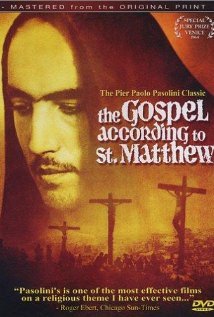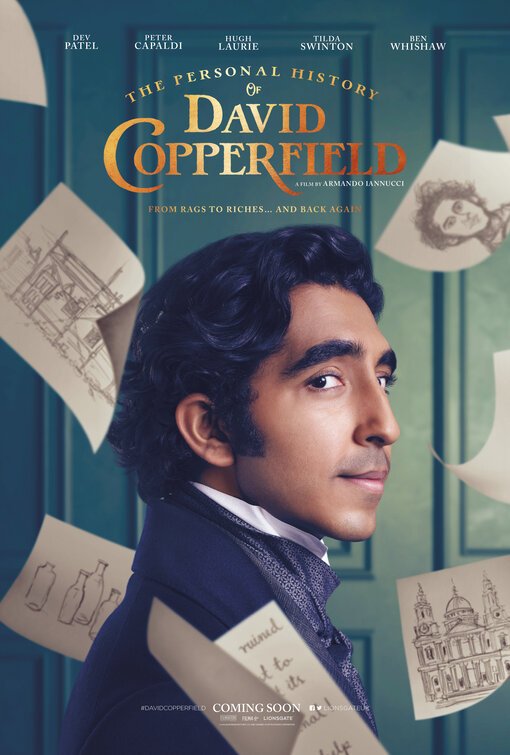“Winsome Comedy and High Drama”

| None | Light | Moderate | Heavy | |
|---|---|---|---|---|
| Language | ||||
| Violence | ||||
| Sex | ||||
| Nudity |
What You Need To Know:
THE PERSONAL HISTORY OF DAVID COPPERFIELD has the makings of a comic masterpiece. It has moments of grand, winsome comedy and high drama. It’s also filled with indelible performances. However, the accents are sometimes hard to understand. Also, parts of the movie seem a little jumbled or hurried, and the “color-blind” casting is a bit distracting. That said, the movie retains the novel’s positive moral sentiments. It exalts compassion, mercy, concern for others, sacrifice, and perseverance. MOVIEGUIDE® advises caution for some light issues in THE PERSONAL HISTORY OF DAVID COPPERFIELD.
Content:
Very strong moral worldview overall where compassion and mercy are extolled, concern for other people and concern for the mistreatment of children is shown, a mentally ill man is treated with compassion, some redemptive qualities such as sacrifice and perseverance and grace and family are extolled or promoted directly and indirectly, and villains are exposed and get their just desserts, with restitution occurring in one case
One “d” obscenity
A sea storm with great lightning explosions occurs, a man swims out to a boat to save another man during the storm, but the attempt is unsuccessful, and people find a body washed up on the shore the next day, a man deliberately smashes some bottles in a factory after being mistreated by one of the factory owners and hearing his mother has died from the factory owner and others, boy’s stepfather tries to whip the boy, and the boy bites the man’s hand, and a villain hits a woman, and she hits back a couple times until another man knocks him out (the violence in the scene has a comic slapstick tone)
It’s implied very discreetly that one female character ends up in a poor London slum surrounded by prostitution and may have even become a prostitute herself after a man abandons her in Europe
No nudity
Brief alcohol use and drunkenness shown in one scene
No smoking or drugs; and,
Light miscellaneous immorality includes such things as some boys are cruel to a boy and attach a sign “Bites Hands” to the boy, villain embezzles funds and emotionally blackmails his employer to become his business partner, boy’s stepfather and the man’s sister are cruel, and a man manipulates a woman to run away with him on the eve of her wedding but later abandons her.
More Detail:
The movie opens with the adult David Copperfield, played by Dev Patel, telling his story before a large audience in a theater. Like the novel, David’s story begins with David’s birth to his mother, Clara, recently widowed. David’s Great Aunt Betsey on his father’s side comes to see the birth, but she leaves in a huff when she learns the infant is a boy, not a girl. (In the novel, it’s explained that Betsey was ill-treated by a husband early in life and has developed a dislike to boys and men.)
David is raised by his mother and her housekeeper, Clara Peggotty. One summer, they send him to live with Peggotty’s brother, who lives in a beached upside-down boat converted to a house in Yarmouth. The brother has adopted a girl named Emily, who’s engaged to a nephew named Ham. Emily and Ham are older in this movie than in the novel and other filmed versions.
After an idyllic summer, David returns home, only to find that his mother has married a stern, mean man named Edward Murdstone. Murdstone’s sister, Jane, comes to live with them and takes over the household’s management.
One day, little David has had enough of Murdstone’s mean behavior and talks back to him. Murdstone takes him to his room to give him a beating with a thin punishment cane, but David bites his hand. So, Murdstone ships David off to London to work in a wine bottling factory he owns. There, David is ill-treated by the co-owner and the other boys, but he lodges at the apartment of Mr. Micawber, who’s always in debt and avoiding his creditors.
Several years appear to pass, and David is suddenly played by the adult Dev Patel. One day, Micawber and his family are sent to the poorhouse, and David starts living on the streets. Murdstone soon shows up, and he and the factory’s staff awkwardly inform David that his mother has died in childbirth, along with David’s little stepbrother. Naturally, David is extremely upset by this continued maltreatment. He starts breaking bottles in the factory and runs away to Dover to seek out his Great Aunt Betsey.
In Dover, Betsey seems to have softened. She takes David into her home but names him David Trotwood after her family name. She’s still pretty eccentric, however, running off anyone who shows up on her property riding a donkey or a horse. “This is a donkey free zone!” she shouts at one point.
David learns Betsey has taken in a mentally ill, distant relative named Mr. Dick. The man is engaged in writing some kind of elaborate petition to the government, but he’s constantly distracted by thoughts of King Charles I, the king who was beheaded for treason when the monarchy was abolished for 11 years in 1649 by the Protestant forces of Oliver Cromwell. Mr. Dick believes that the dead King’s thoughts have somehow been magically transferred into his mind when the King died. David relates to Mr. Dick because, for years, David has been writing down thoughts and dialogue from his life and the people and situations he’s encountered. He encourages Mr. Dick to clear his mind by taping all his thoughts about King Charles onto a large kite and flying it outside. David’s solution seems to work, and Mr. Dick becomes more stable and happier, but still a bit daft.
David also meets Betsey’s alcoholic lawyer, Wickfield, and his daughter, Agnes. Agnes is a practical but caring and insightful young woman who develops an unrequited love for David.
Eventually, David goes to a school, where he befriends an untrustworthy student named James Steerforth. David also reunites with Mr. Micawber and his family, who have escaped the poorhouse but still seem on the verge of going back to the poorhouse. After school, David works for a man named Spenlow and falls for Spenlow’s daughter, Dora. Dora is a charming but ditzy girl who likes to pretend that her lapdog can talk. Smitten, David enjoys the joke and, in a very funny scene, imagines that the tree next to them can talk as well.
The movie’s story takes a dark turn when Uriah Heep, a conniving but obsequious man who worked at David’s school, starts working for Aunt Betsey’s lawyer, Wickfield. Heep takes advantage of Wickfield and his daughter, Agnes, and eventually bilks Aunt Betsey out of her fortune. Meanwhile, David’s friend Steerforth takes advantage of his friend, Emily, and convinces her to run away with him on the eve of her marriage to Ham. Everyone ends up living in the slums that Heep has bought by embezzling and extorting money from Wickfield and his clients.
How can David, Aunt Betsey and their friends correct these injustices?
THE PERSONAL HISTORY OF DAVID COPPERFIELD has the makings of a comic masterpiece. It has moments of grand, winsome comedy and high drama. Also, it’s filled with some indelible, excellent performances.
However, the accents are sometimes hard to understand and parts of the movie seem a little jumbled or hurried, especially in the first act when the movie’s introducing characters like the housemaid’s brother and family and Mr. Dick. The movie doesn’t take a breath to properly introduce the brother and his family, and the family relationship between Mr. Dick and Aunt Betsey is never clearly presented. Also, unlike the masterful 1935 version starring the wonderful child actor Freddie Bartholomew, this version suddenly turns the titular hero into a young adult, played by Dev Patel, while David’s working in the London bottling factory. The sudden shift is too abrupt and not quite convincing, especially when David walks to Aunt Betsey’s country home in Dover and reunites with her. It’s more convincing if Betsey accepts a young boy into her house rather than a young man. The movie doesn’t give the child actor playing the boy enough to do to capture the viewer’s heart. Also, despite the good performances, the movie’s Scottish-Italian Director Armando Iannucci adopts a “color-blind” approach to casting his movie. Thus, Wakefield is played by a Chinese actor and his daughter, Agnes, is played by a young black woman. Also, Steerforth is played by a white actor and his mother by a black actress. This kind of casting may have good intentions, but it’s a bit politically correct, distracting and unconvincing, if not annoying. It draws attention away from the characters and the plot. It also raises questions. Why not also make David’s mother of Indian background, like Dev Patel? Or, why not let Asian or black actors play the villains Uriah Heap, Edward Murdstone or Murdstone’s sister, Jane? Finally, isn’t the use of non-white actors in a Dickens story set in Victorian England an example of cultural appropriation of a white culture? Somehow, we doubt that any of today’s filmmakers will take a play about black people like RAISIN’ IN THE SUN or PORGY & BESS and cast it with mixed-race actors, much less all-white actors or all Asian actors.
That said, the story in this movie version becomes more captivating as it goes along. The talent of the actors, whatever their skin color or ethnic background, perseveres. There are too many good performances to call out most of them. However, Dev Patel as David Copperfield, Peter Capaldi as Micawber, Rosalind Eleazer as Agnes, Ben Whishaw as Uriah Heap, and Tilda Swinton and Hugh Laurie as Aunt Betsey and Mr. Dick are particularly fine or enjoyable. As Dora, Morfydd Clark is hilarious and endearing. Her performance should get some nominations come awards season, if there’s any justice at all. Some of the others listed above probably will get some nods as well.
The good news is that THE PERSONAL HISTORY OF DAVID COPPERFIELD retains the original novel’s positive moral, redemptive sentiments, including its Dickensian outrage against mistreatment of others, especially children, and its concern for the poor and destitute. The compassion David and his aunt have toward the befuddled Mr. Dick is touching, as is David’s grace toward poor Mr. Micawber, who returns the favors David bestows on him in heroic fashion. Eventually, Uriah Heep gets his just desserts, and the good guys are rewarded.
Finally, the movie is fairly wholesome. There’s one light obscenity and a scene where David gets drunk with his school friends. Also, it’s implied very discreetly that Emily ends up in a poor London slum surrounded by prostitution and may have even become a prostitute herself after Steerforth abandons her in Europe. An ocean storm toward the end may scare some younger children. A light caution is therefore advised for THE PERSONAL HISTORY OF DAVID COPPERFIELD.
By the way, the actual, lengthy title of Charles Dickens’ famous autobiographical novel is THE PERSONAL HISTORY, ADVENTURES, EXPERIENCE AND OBSERVATION OF DAVID COPPERFIELD THE YOUNGER OF BLUNDERSTONE ROOKERY (WHICH HE NEVER MEANT TO PUBLISH ON ANY ACCOUNT). If that’s not a comical title, what is?


 - Content:
- Content: 






